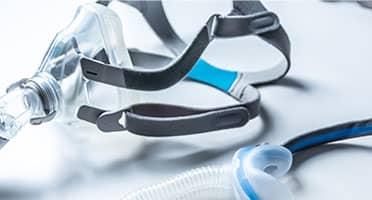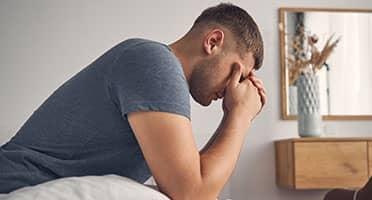
For many, fears about sleep apnea treatment are scarier than the possibility of having sleep apnea. It may seem attractive and easy to blissfully ignore the likelihood of sleep apnea, even when experiencing daytime sleepiness, morning headaches, and cognitive decline. But it’s crucial to get a sleep study if you suspect you may have sleep apnea.

Traditional sleep apnea testing is done in a lab over one night. It’s called in-lab polysomnography. You go to a sleep testing lab for one night, and sensors and a tech monitor your sleep for the night. The data is then given to a sleep doctor who would diagnose you or not. However, the problem is that sleep apnea episodes fluctuate nightly, making the severity of your sleep apnea hard to diagnose in just one night of monitoring. Not only that, but sleep testing labs can be uncomfortable, like sleeping in a hotel. You may or may not sleep as you normally would at home.

Many people suffer from sleep deprivation. In fact, as many as 50 – 70 million Americans suffer from a sleep disorder that significantly impacts their lives. One such disorder is sleep apnea. Sleep apnea is when you experience interruptions in breathing throughout the night. These interruptions can last 8 seconds or longer, depending on the severity of the disorder. They can happen hundreds of times per night, preventing your body from getting the oxygen and sleep it needs to function in the following days.

Sleep apnea is a sleep disorder that plagues millions of people worldwide, with many cases going undiagnosed and untreated. When you have sleep apnea, you experience pauses in breathing while you sleep. These pauses can last anywhere from 10 seconds, a minute, or even longer before your brain panics and awakens you so you can resume breathing. You may not always notice these awakenings, but they can happen hundreds of times during the night for those who suffer from sleep apnea. Your lack of sleep and interruptions in your sleep cycle results in consequences like daytime sleepiness, morning headaches, and snoring. While you think you may be able to deal with those, there are other, more dangerous effects of untreated sleep apnea, too, like increased risk of stroke, diabetes, and heart disease.

Between balancing work, family life, and your social life, it can be hard to find time to go to the doctor to address your sleep apnea. And yet, when you aren’t sleeping well, it can be even harder to balance all those different aspects of life. When we sleep, our brain and body work on restoring themselves so we’re ready for the next day. And if that can’t happen, how can we expect ourselves to manage that balancing act?

Do you think you might have sleep apnea? A great way to diagnose this condition is with a home sleep study. Don’t worry–you can have a sleep test sent directly to you and take it in the comfort of your own bed. Then, if your results indicate that it’s appropriate, we can connect you with a local dentist from our network that can fit you with a custom oral appliance for easy treatment.





